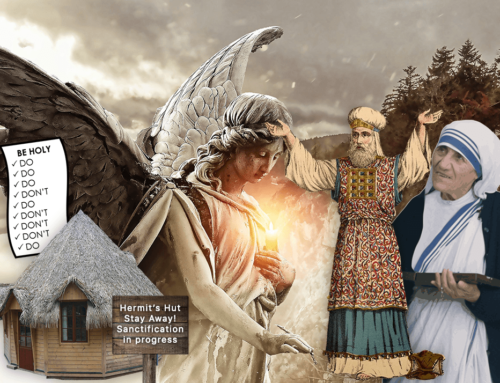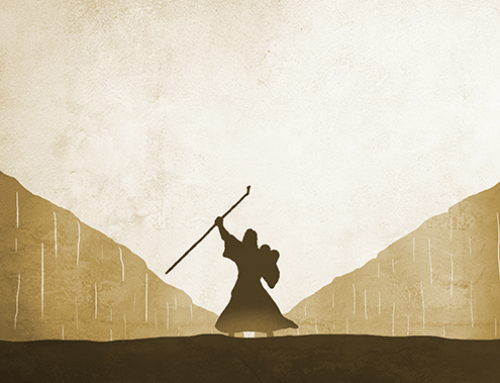
Pyrenees Donkey
What happens when we do not see God for who He really is?
Jude had something to say about this. In his letter, he introduces himself as the brother of James and a servant of Jesus Christ. Like James, he does not call attention to the fact that he is also a brother, or half-brother so-to-speak, of Jesus. But listen to what this man says who grew up as a member of Jesus’ family:
Jude 3 Dear friends, I’ve dropped everything to write you about this life of salvation that we have in common. I have to write insisting—begging!—that you fight with everything you have in you for this faith entrusted to us as a gift to guard and cherish. 4 What has happened is that some people have infiltrated our ranks…, who beneath their pious skin are shameless scoundrels. Their design is to replace the sheer grace of our God with sheer license—which means doing away with Jesus Christ, our one and only Master.
10 … these people sneer at anything they can’t understand, and by doing whatever they feel like doing—living by animal instinct only—they participate in their own destruction. 11 I’m fed up with them! They’ve gone down Cain’s road; they’ve been sucked into Balaam’s error by greed; they’re canceled out in Korah’s rebellion.
16 These are the “grumpers,” the bellyachers, grabbing for the biggest piece of the pie, talking big, saying anything they think will get them ahead.
17 But remember, dear friends, that the apostles of our Master, Jesus Christ, told us this would happen: 18 “In the last days there will be people who don’t take these things seriously anymore. They’ll treat them like a joke, and make a religion of their own whims and lusts.” 19 These are the ones who split churches, thinking only of themselves. There’s nothing to them, no sign of the Spirit!
20 But you, dear friends, carefully build yourselves up in this most holy faith by praying in the Holy Spirit, 21 staying right at the center of God’s love, keeping your arms open and outstretched, ready for the mercy of our Master, Jesus Christ. This is the unending life, the real life!
22 Go easy on those who hesitate in the faith. 23 Go after those who take the wrong way. Be tender with sinners, but not soft on sin. …
[Quoted from The Message: The Bible in Contemporary Language, NavPress, 2002]
Jude is warning the believers about those in their midst, people within the church, who don’t take God’s ways seriously and who “make a religion of their own whims and lusts.” In verse eleven, he exclaims, “Woe to them! They have taken the way of Cain; they have rushed for profit into Balaam’s error; they have been destroyed in Korah’s rebellion.” Well if you are like me, you are probably thinking, “What on earth does that mean? I know Cain slew Abel, and there was something about Balaam and a donkey, but who was Korah and what was his rebellion?” Let’s find out.
FIRST: The Way of Cain: In Genesis chapter 4, beginning with verse 2, we read the story of Cain and Abel.
Gen. 4:2b Now Abel kept flocks, and Cain worked the soil. 3 In the course of time Cain brought some of the fruits of the soil as an offering to the LORD. 4 But Abel brought fat portions from some of the firstborn of his flock. The LORD looked with favor on Abel and his offering, 5 but on Cain and his offering he did not look with favor. So Cain was very angry, and his face was downcast.
6 Then the LORD said to Cain, “Why are you angry? Why is your face downcast? 7 If you do what is right, will you not be accepted? But if you do not do what is right, sin is crouching at your door; it desires to have you, but you must master it.”
8 Now Cain said to his brother Abel, “Let’s go out to the field.” And while they were in the field, Cain attacked his brother Abel and killed him.
9 Then the LORD said to Cain, “Where is your brother Abel?”
“I don’t know,” he replied. “Am I my brother’s keeper?”
10 The LORD said, “What have you done? Listen! Your brother’s blood cries out to me from the ground. 11 Now you are under a curse and driven from the ground, which opened its mouth to receive your brother’s blood from your hand. 12 When you work the ground, it will no longer yield its crops for you. You will be a restless wanderer on the earth.”
13 Cain said to the LORD, “My punishment is more than I can bear. 14 Today you are driving me from the land, and I will be hidden from your presence; I will be a restless wanderer on the earth, and whoever finds me will kill me.”
15 But the LORD said to him, “Not so; if anyone kills Cain, he will suffer vengeance seven times over.” Then the LORD put a mark on Cain so that no one who found him would kill him. 16 So Cain went out from the LORD’s presence and lived in the land of Nod, east of Eden.
[Quoted from Holy Bible: New International Version, Zondervan, 1984]
Abel brought the best of his flocks as a sacrifice to God, but Cain brought simply “an offering.” The Lord told Cain he could do better, and warned him not to fall into sin. But Cain did not heed the warning and killed his brother out of envy and anger. He then lied to try to cover up his sin and, even after he was confronted by the Lord, showed no remorse, but complained that his punishment was unjust. Even though Cain clearly demonstrated his hardness of heart, the Lord had compassion on Him and protected Him by setting a mark on him, promising to avenge him sevenfold if anyone should slay him. Cain’s descendant Lamech demonstrates the attitude that Cain apparently had fostered in his children when he said, “…I have killed a man for wounding me; And a boy for striking me; If Cain is avenged sevenfold, Then Lamech seventy-sevenfold.” (Gen. 4:23f-24) God’s protection on Cain had been twisted into the right to eliminate anyone that got in his way.
So what is “The Way of Cain”? Cain chose to harden his heart and to blame everyone but himself for his problems. He was willing to go to any lengths to justify himself in his own eyes. He refused to listen to the voice of the Lord calling him to turn from his self-centeredness and was overcome by sin.
Second: The Error of Balaam: In Numbers chapter 22 we read that Balaam was a prophet of God. Balak, a Moabite, called on Balaam when he heard that the Israelites had escaped from the slavery of Egypt and were coming his way. Balak wanted Balaam to curse the Israelites so that he could win a victory over them. Balaam prayed about the request, and the Lord told him not to go with Balak’s men and not to curse the Israelites, because they were blessed. So Balaam refused to help Balak. But when Balak heard Balaam’s reply, he tried again, this time promising a rich reward for Balaam’s help. Balaam declared that he could not help them. But… he went to pray anyway, to “see what else the Lord might speak to him.” The Bible tells us that the Lord then said to Balaam, “Since these men have come to summon you, go with them, but do only what I tell you.” So, in the morning, Balaam went with Balak’s men… and the Lord was angry. You probably know the rest of the story. The Lord sent an angel to block the way, but Balaam couldn’t see the angel, although his donkey could. Balaam tried to force the donkey to pass and the Lord allowed the donkey to speak, rebuking Balaam. Finally, Balaam’s eyes were opened and he saw the angel blocking the way.
So, what was “The Error of Balaam”? This story seems confusing at first, because the Lord first tells Balaam not to go with Balak’s emissaries. The second time the Lord tells him to go, but with a warning. And then the Lord is angry because Balaam actually did go. What’s going on here? Well, let’s go back and look at what Balaam was doing in the story. He began by seeking the Lord’s will on the matter when Balak’s men first approached him. All well and good. The Lord gave him a clear answer which Balaam obeyed. Also good. But what happened the next time around? The same situation came around again. Didn’t Balaam already know the answer? Hadn’t God already given him clear direction? What did Balaam do? He went back to see if maybe he could get a different answer from God. And how did God respond? “If you insist on going with them, go ahead and go! But you know what I told you!” Balaam chose to ignore what He knew was right and seek the solution he wanted. He was seeking God’s permission, if you will, to do what he knew was not pleasing to God in order to profit himself.
Third: The Rebellion of Korah: In Numbers chapter 16 we find the story. Korah was a Levite, but not a priest. In other words, he was from the same tribe as Moses and Aaron, but God had made Aaron and his sons the priests. Although all of the tribe of Levi were set apart for God’s service, only Aaron and his sons were allowed to burn incense and make sacrifices before the Lord. Korah apparently got jealous and angry about the situation, so he and a couple friends gathered 250 leaders of the Levites together to confront Moses. They accused Moses and Aaron, saying “You have gone far enough, for all the congregation are holy, every one of them, and the LORD is in their midst; so why do you exalt yourselves above the assembly of the LORD?” In other words, they called Moses and Aaron self-righteous and arrogant and accused them of claiming to be “holier than thou” and lording it over them. Moses prostrated himself and responded by telling the gathered leaders to come the next day and bring their incense before the tent of meeting to allow the Lord to decide the matter. When they all gathered the next day before the Lord, the Lord told Moses and Aaron to step aside so that He could wipe out every one of the rebels, but they begged mercy and the Lord relented. Only Korah and the other instigators of the rebellion were punished. The earth opened up beneath their tents and swallowed them up.
So, what was “The Rebellion of Korah”? The Lord God had appointed Moses and Aaron and Aaron’s sons to serve before Him, but Korah argued that he and the others of the congregation were just as holy. That very well may have been true, but it wasn’t the point. The point was, Korah disregarded the Word of the Lord in favor of his own judgment. Not only that, but he incited others to do likewise.
Turning back to Jude’s letter… Jude warned the believers that these same attitudes are found within the church. Some “go the way of Cain.” Unwilling to admit his shortcomings, he laid the blame on others and was willing to go to any length to justify himself in his own eyes. Cain did not see God for who He really is. He did not see that God was desirous of teaching him to do better and helping him to grow. He did not see that God was being merciful by placing His mark upon him. Instead, he focused on God’s rejection of his half-hearted sacrifice and nurtured bitterness in his heart.
Some fall for “the error of Balaam.” Balaam knew God’s will for him, but he didn’t really want to do it. He wasn’t about to be outright disobedient, but he reasoned that if he could wheedle God into letting him go his own way, it wouldn’t technically be disobedience. He thought he could get away with having it his own way without having to deal with the consequences. Balaam did not see God for who He really is. He thought God could be manipulated. But the good news is that Balaam learned his lesson. In Numbers 23:19-20 Balaam declares, “God is not a man, that he should lie, nor a son of man, that he should change his mind. Does he speak and then not act? Does he promise and not fulfill? I have received a command to bless; he has blessed, and I cannot change it.”
What about those who join “the rebellion of Korah”? Korah knew the Word of God, but he decided that it didn’t apply to him. Korah put himself in the place of God in his life. He did not see God for who He really is. God is Sovereign. He is the One and only God. He is in control. But Korah wanted to be in control.
You know… I have discovered that we often attribute selfish motives to God. When we hear that God is Sovereign and that He is in control, we picture Him as a control freak, trying to make a grab for power. We subconsciously picture Him as having an obsession for being in control–and we seem determined to try to keep it from Him.
Sometimes, we picture God as having an obsession for trying to catch us at some sin so that He can pounce on us with judgment. Or we picture Him keeping score of our Bible reading or our prayer time or our attendance at worship services or our giving or our service.
And then sometimes we think of Him as selfish because He wants us all to Himself–after all, isn’t it selfish to demand that He have first place in your heart and life? Isn’t it selfish of Him to demand that you do things His way?
Let me tell you something. God is never selfish. He could not be selfish if He tried, because selfishness is contrary to His very nature. In everything He asks of you, He ALWAYS has your best interests at heart, because that is who He is. If you picture God having selfish motives, you do not yet see Him for who He really is.
He asks you to come to Him in obedience and to walk in His ways because He desires to walk alongside you and to lavish His lovingkindness and mercy and grace on you day by day, hour by hour, and minute by minute. He understands that you are broken because of sin and that you are hurting because you live in a sinful world, and He desires to make you whole again.
- Robert Mulholland writes, “Gracious and loving God, I stand in awe of your infinite patience. You desire my perfect wholeness. You are deeply desirous to make me perfectly whole, even to the extent of entering into my brokenness and taking its death into your own being on the cross. And yet you never violate my independence, you never trample upon my free will, you never usurp the integrity of my being. You wait in infinite patience for me to open my life to your cleansing, healing, liberating, transforming grace. You wait for me to willingly cooperate with your purposes for my wholeness.” (Invitation to a Journey: A Road Map for Spiritual Formation, InterVarsity Press, 1993, 135)
I wonder where you stand this morning. Have you been going the way of Cain? Have you been blaming others and justifying yourself? Have you been hardening your heart against God’s attempts to bring wholeness and healing into your life? Have you fallen for the error of Balaam? Do you know God’s will–what He has clearly told you to do, but have you been trying to find some excuse for doing things your own way instead? Have you joined the rebellion of Korah? Placing yourself in the place of God by placing yourself above the Word of God?
Do you simply need to see God more clearly–to see Him as He really is? Do you need Him to clear away the false beliefs you have held of Him because of your past or because of your sin? Do you need Him to come and show you who He really is?
Hebrews 4:16 tells us we are able to “approach the throne of grace with confidence, so that we may receive mercy and find grace to help us in our time of need.” If the Lord has been speaking to you about something this morning, don’t put it off, talk with Him about it. Allow the Holy Spirit to come alongside you and bring His grace, mercy, and lovingkindness to you through prayer. Maybe you need to ask His forgiveness. Maybe you need His help to see Him as He really is. Maybe you have never taken the step of asking Jesus to be your Lord and Savior, to forgive you of your sins and to begin the process of making you whole. Maybe you have been walking your own way and you need to get back in step with Him.
Pastor Cindy
[Adapted from a sermon originally preached June 28, 2009.]





Hmmmm…very thought-provoking. Am I one of these?
I needed this today. Thanks for sharing.